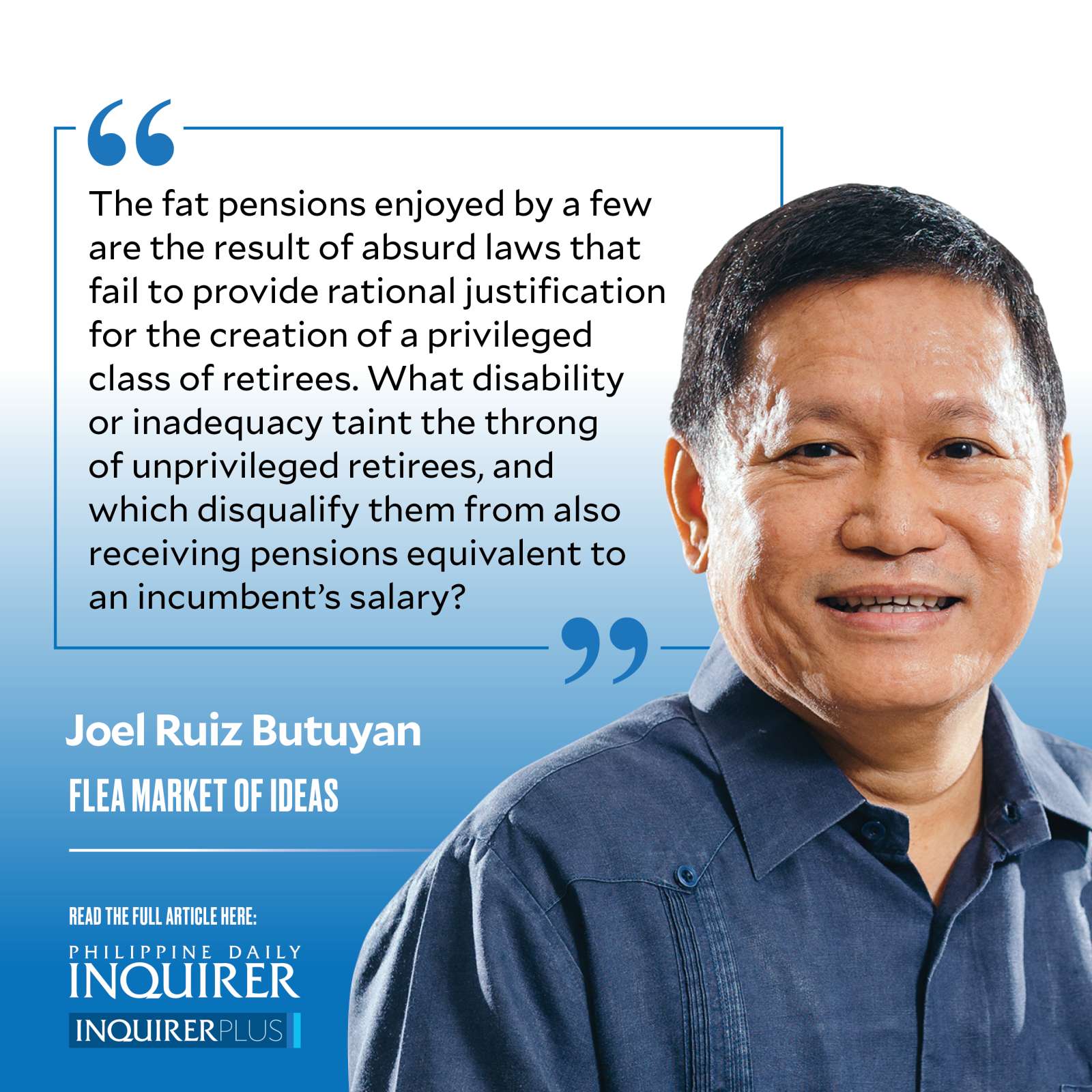Pensions that violate the Constitution

Our country faces serious financial disaster in the coming years because of the reckless governance and myopic visions of past administrations. This is due to the pension mess of our military and uniformed personnel (MUP) that eats up a huge chunk of our annual tax revenues and which is constantly increasing by leaps and bounds every year.
The MUP consists of members of the Armed Forces of the Philippines, Philippine National Police, Philippine Coast Guard, Bureau of Fire Protection, Bureau of Jail Management and Penology, the Bureau of Corrections, and National Mapping and Resource Information Authority.
For 2023 alone, our government had to allocate a whopping P273 billion to fund the pension and gratuity fund for MUPs. The number of retired MUP personnel is 137,649 as of the first quarter of 2023. Contrast this to the P224 billion disbursed by the Social Security System (SSS) for the pension, retirement, and other benefits of 3.36 million pensioners and members of the private sector in 2021.
Compare also the P273 billion pension benefits of MUPs to the 2023 budgets of the Department of Social Welfare and Development at P199 billion, and the Department of Health at P209 billion. The 2023 pension fund of MUPs is even ridiculously much higher than the P110 billion budget of the AFP for its operating expenditures and capital outlays for 2023.
The Government Service Insurance System (GSIS) previously disclosed in a Senate hearing its actuarial study which shows that P9.6 trillion is needed for a seed fund to set up a viable pension system for MUPs. “In order to fund said seed fund, the study suggests that Congress needs to appropriate more than P800 billion annually, for 20 years,” according then Sen. Panfilo Lacson.
Compare this P800 billion per year (for 20 years) requirement of an MUP pension fund to the following 2023 budgets of the following government departments: P678 billion of the Department of Education; P893 billion of the Department of Public Works and Highways; and P86 billion for the Department of Agriculture.
The pension and retirement benefits of MUPs have ballooned to humongous amounts because former president Duterte doubled the base pay of active MUPs, to reportedly endear himself with military and police personnel, and despite opposition from his economic team. And since the monthly pension of a retired MUP is equivalent to the salary of one still in active duty, MUP pension requirements are ballooning to unsustainable heights. The average monthly pension of MUPs is P40,000.
The indexing of pensions to the salaries of those still in active service is a special privilege also enjoyed by members of the judiciary. Retired judges and justices receive the equivalent base salary of a sitting judge or justice. A retired municipal judge is therefore entitled to receive a monthly pension of P140,000.
It gets juicier for constitutional bodies like the Commission on Elections, Commission on Human Rights, Civil Service Commission, Ombudsman, and also the Energy Regulatory Commission. The commissioners and heads of these offices serve for a maximum of seven years. After their short stint, they receive pension equivalent to the salary of an incumbent commissioner, for the rest of their lives. A retired constitutional commissioner is entitled to receive a monthly pension of P186,000.
In contrast to these special class of retirees, all other retirees receive measly pension benefits. The average monthly pension of SSS retirees is P4,528. For GSIS retirees, it’s P13,600. But what’s the difference between the special class of retirees and lawyers, doctors, engineers, nurses, accountants, university professors, and rank and file employees who toil for decades in government offices, and yet receive miserly pensions when they retire? With the taxes they pay, these unprivileged retirees subsidize the fat pensions of the privileged few.
The fat pensions enjoyed by a few are the result of absurd laws that fail to provide rational justification for the creation of a privileged class of retirees. What disability or inadequacy taint the throng of unprivileged retirees, and which disqualify them from also receiving pensions equivalent to an incumbent’s salary? These laws violate the equal protection clause of the Constitution and deserve to be struck down. The question is, will judges and justices renounce the special pension privileges waiting for them when they retire?
——————-
Comments to fleamarketofideas@gmail.com




















